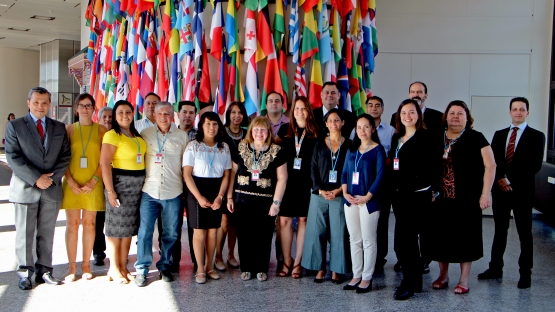Approximately one third of the globe’s renewable water resources can be found in Latin America and the Caribbean. However, as the exploitation of these hydrological resources intensifies, damaging effects have become evident: shrinking water tables, deteriorating water quality, and the gradual loss of biodiversity.
The IAEA is helping 15 Latin American and Caribbean countries to use isotopic techniques to make a comprehensive assessment of the quality and quantity of their freshwater resources. The information which will emerge from these assessments will inform water- and land-use policies, ensuring long term access to potable sources of water.
Without comprehensive hydrological data related to surface and groundwater sources, the sustainable use of those sources can be very challenging. However, by identifying and tracking the isotopic ‘fingerprints’ found in water samples, nuclear techniques can provide rare insight into the composition, age, movement, and interaction of water sources.
These technologies are at the heart of the IAEA Water Availability Enhancement Project (IWAVE), an initiative launched in 2010 with the aim of supporting Member States as they conduct rigorous, science-based assessments of their national water resources. Using the IWAVE methodology of data-collection, this ongoing regional project1 will equip Member States with reliable tools to better manage their water resources, in the hope that better access to information at the national level will also result in greater cooperation in the management of water resources at the regional level.
Under the auspices of this project, stakeholders and delegates from Colombia, Mexico, Paraguay and the Plurinational State of Bolivia gathered at the IAEA’s Vienna headquarters from 13-17 August 2018 to attend a preliminary coordination meeting.
“Coordination at national level between the different institutions in charge of, and involved in, water resources management is at the core of the sustainability of this project. The commitment of these participating institutions will contribute to the sustainability of the project results and thus for improved water management practices in Latin America and the Caribbean,” Luis Longoria Gandara, Director of the Division for Latin America and the Caribbean, explained to the attending delegates.
Member States that participated in the coordination meeting will act as pilot countries for the implementation of the IWAVE methodology. Following the pilot period, the other participating countries will benefit from the exchange of experience, capacity building, and networking.
1 RLA7024, ‘Integrating Isotope Hydrology in National Comprehensive Water Resources Assessments’


